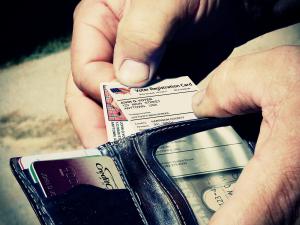Did Purcell v. Gonzalez Force the Supreme Court to Green Light the Texas Voter ID Law?

After a federal judge the concluded the Texas voter identification law placed an unconstitutional burden on the rights of minority voters, the U.S. Supreme Court inexplicably issued an emergency order giving it the green light. While the justices may ultimately strike down the law, it appears the majority believed their hands were tied when it comes to the upcoming November elections. While the Supreme Court’s unsigned order did not provide an explanation, it likely relied on the precedent established in Purcell v. Gonzalez, which emphasized the importance of preserving the status quo on the eve of an election.
The Facts of the Case
In 2004, Arizona voters approved Proposition 200, which requires voters to present proof of citizenship when they register to vote and to present identification when they vote on Election Day. While the United States Attorney General precleared the procedures under the Voting Rights Act, several plaintiffs challenged the law. Several weeks before the scheduled election, the Court of Appeals issued a four-sentence order enjoining Arizona from enforcing Proposition 200’s provisions pending disposition, after full briefing, of the appeals of the denial of a preliminary injunction.
The Supreme Court’s Decision
The Supreme Court vacated the injunction, thereby maintaining the status quo. “Given the imminence of the election and the inadequate time to resolve the factual disputes, our action today shall of necessity allow the election to proceed without an injunction suspending the voter identification rules,” the Court held.
As further explained by the Court, “Faced with an application to enjoin operation of voter identification procedures just weeks before an election, the Court of Appeals was required to weigh, in addition to the harms attendant upon issuance or nonissuance of an injunction, considerations specific to election cases and its own institutional procedures.”
The Impact on the Texas Voter ID Law
The Fifth Circuit Court of Appeals relied on Purcell when it stayed the trial court’s ruling pending appeal, noting that the court struck down the voter ID law just nine days before early voting begins and just 24 days before Election Day.
At the Supreme Court, not all of the justices were on board. In a scathing dissent, Justice Ruth Bader Ginsberg argued that the majority decision “imposes an unconstitutional poll tax” and endorses the “strictest regime in the country.” Justices Sotomayor and Kagan joined her.
Ginsberg further noted that, unlike in Purcell and other recent voting rights cases, the Texas district court’s decision followed a full trial and rested on an extensive record. Accordingly, the Fifth Circuit should have given it deference. “Purcell held only that courts must take careful account of considerations specific to election cases, not that election cases are exempt from traditional stay standards,” she stated.
The Obama Administration also expressed frustration. “It is a major step backward to let stand a law that a federal court, after a lengthy trial, has determined was designed to discriminate. It is true we are close to an election, but the outcome here that would be least confusing to voters is the one that allowed the most people to vote lawfully,” Attorney General Eric Holder Jr. stated.
Previous Articles
SCOTUS Decision in Bowe v. United States Is First of the 2026 Term
by DONALD SCARINCI on February 5, 2026
In Bowe v. United States, 607 U.S. ___ (2026), the U.S. Supreme Court held that Title 28 U.S.C. § ...
SCOTUS Rules State Can’t Immunize Parties from Federal Civil Liability
by DONALD SCARINCI on January 29, 2026
In John Doe v. Dynamic Physical Therapy, LLC, 607 U.S. ____ (2025) the U.S. Supreme Court held that...
Supreme Court to Address Racial Discrimination in Jury Selection
by DONALD SCARINCI onWhile the U.S. Supreme Court has concluded oral arguments for the year, it continues to add cases t...
The Amendments
-
Amendment1
- Establishment ClauseFree Exercise Clause
- Freedom of Speech
- Freedoms of Press
- Freedom of Assembly, and Petitition
-
Amendment2
- The Right to Bear Arms
-
Amendment4
- Unreasonable Searches and Seizures
-
Amendment5
- Due Process
- Eminent Domain
- Rights of Criminal Defendants
Preamble to the Bill of Rights
Congress of the United States begun and held at the City of New-York, on Wednesday the fourth of March, one thousand seven hundred and eighty nine.
THE Conventions of a number of the States, having at the time of their adopting the Constitution, expressed a desire, in order to prevent misconstruction or abuse of its powers, that further declaratory and restrictive clauses should be added: And as extending the ground of public confidence in the Government, will best ensure the beneficent ends of its institution.





